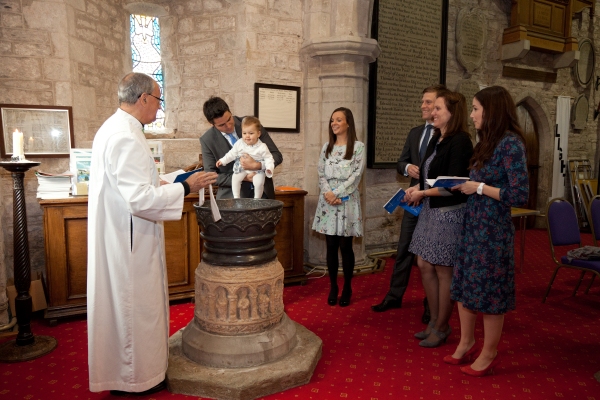Baptism
 A person may be baptised at any point in their life. Infant baptism is expressly authorised under the thirty-nine articles, but it is perfectly possible to be baptised later in life, and in that case the person who is to be baptised can answer for themselves. In the case of infants, parents and Godparents make promises on behalf of the child.
A person may be baptised at any point in their life. Infant baptism is expressly authorised under the thirty-nine articles, but it is perfectly possible to be baptised later in life, and in that case the person who is to be baptised can answer for themselves. In the case of infants, parents and Godparents make promises on behalf of the child.
Where the parents do not reside in the parish and are not on the electoral roll for the parish, it is appropriate for the minister who is to administer the ceremony first to consult with and obtain the approval of the parish in which the parents live.
Baptism is normally administered by a priest, but the ceremony can be performed by a deacon if a priest is not readily available.
Child baptism and the consent of the parents
Clergy can be faced with difficult decisions when they are asked to baptise a child without the consent of one of the parents. Every case will have its own particular facts and circumstances, but what follows it intended to offer general guidance.
Canon law
Canon law (see Canon B22) has never required the consent of a parent before a child is baptised, and in the case of a sudden emergency that may be impractical anyway.
Canon B22 indicates that clergy are to instruct parents or guardians of an infant to be admitted to Holy Baptism. Clergy will wish, to their best endeavours, try wherever possible to fulfil the duty to instruct both parents of the child.
Parental responsibility
Canon law must be applied with due regard for the law of the land. This means that ordinarily it will be appropriate to consider whether both parents consent to the proposed baptism of their child.Where a child is brought for baptism by one parent alone, enquiries should be made about the reasons for the absence of the other parent. If the other parent is still living, then attempts should be made to contact him/her and it may be necessary to postpone the baptism so that this can be done.
If the consent of one parent is lacking, then it may be necessary to ask whether both parents have “parental responsibility”, as the term “parent” for the purposes of infant baptism should be taken as referring to a person who has parental responsibility under the Children Act 1989.
Where the child’s parents are married to each other at the time of the birth, then both parents have parental responsibility automatically and the consent of both will be required. Where the parents are not married, then the father will only have parental responsibility if:
- The court has so ordered, or
- The parents have entered into a parental responsibility agreement, or
- The father’s name is on the birth certificate.
Where the mother only has parental responsibility, then the Canon only applies to her and ordinarily her consent alone will be required. However, it is possible that the Courts may be asked to rule on the question of whether a child should be baptised without the agreement of both parents, so appropriate and sensitive enquiries ought to be made before proceeding. If the minister learns that a court order to prohibit baptism has been made (or is actively being sought), then baptism should be refused until such time as the court has given directions in the matter.
Complex cases
In cases of particular difficulty, it is possible to apply to the Bishop for directions, and clergy are encouraged to seek advice from the Diocesan Registrar. Alternatives to baptism include the Service of Thanksgiving for the Gift of a Child.


